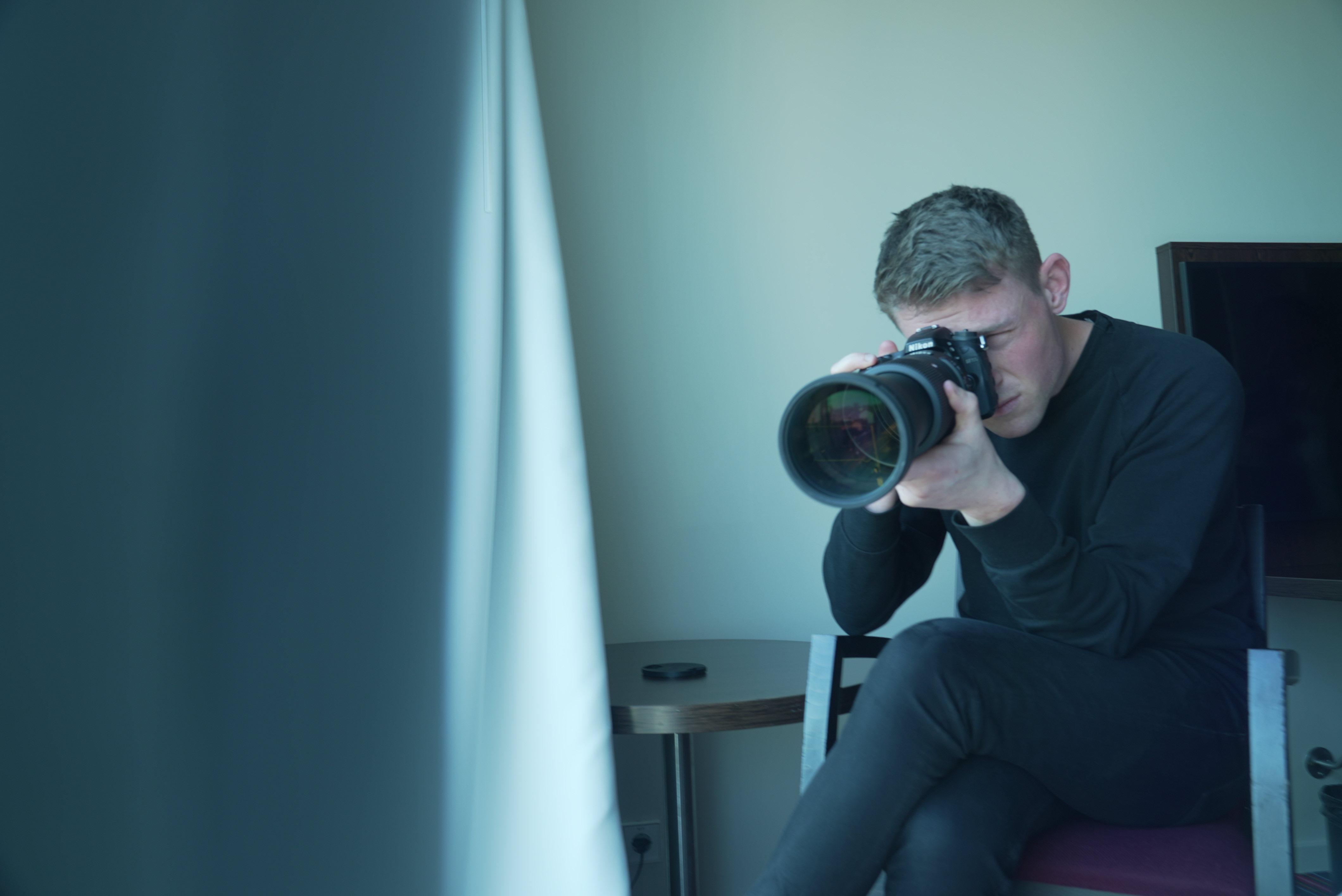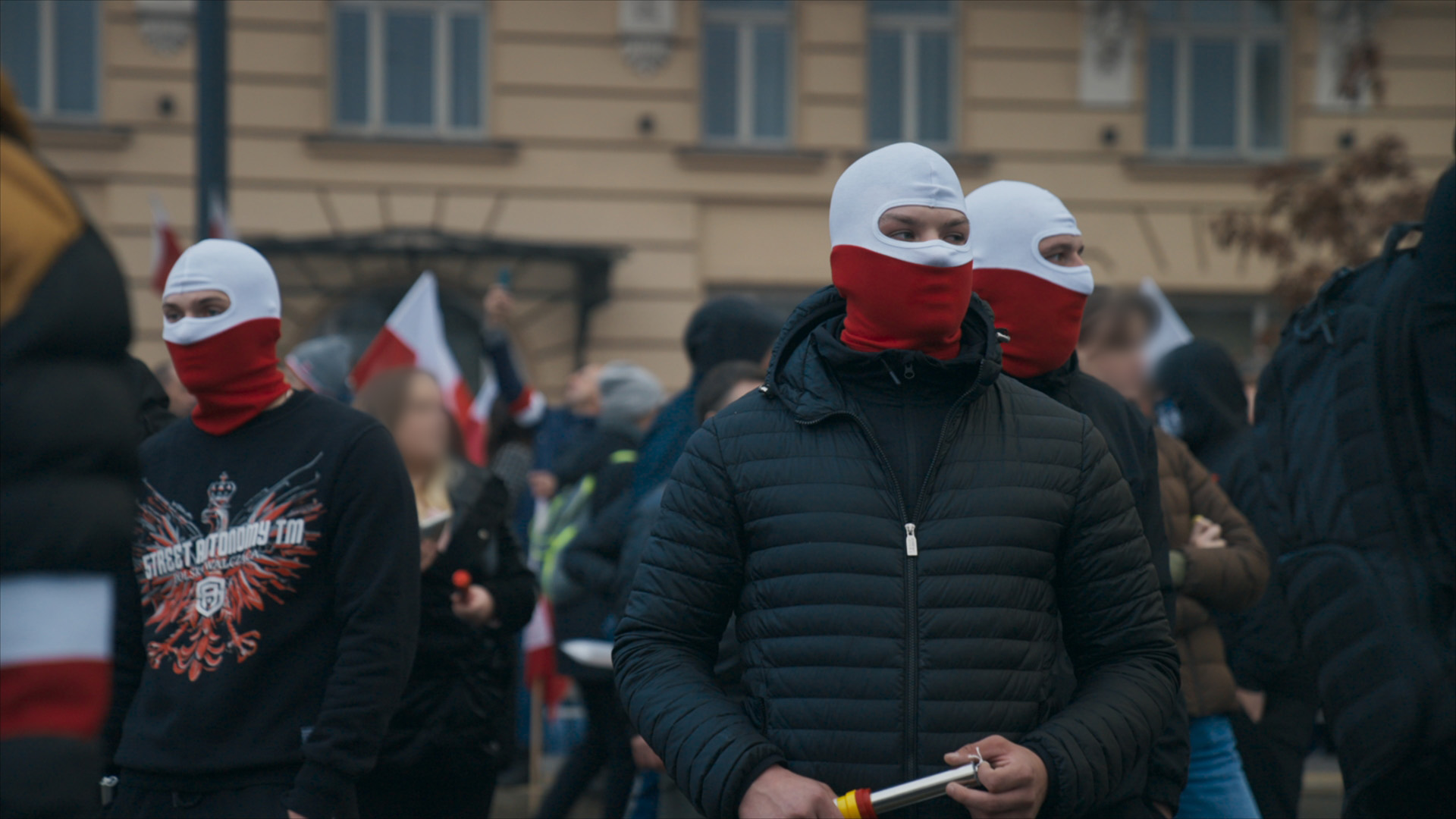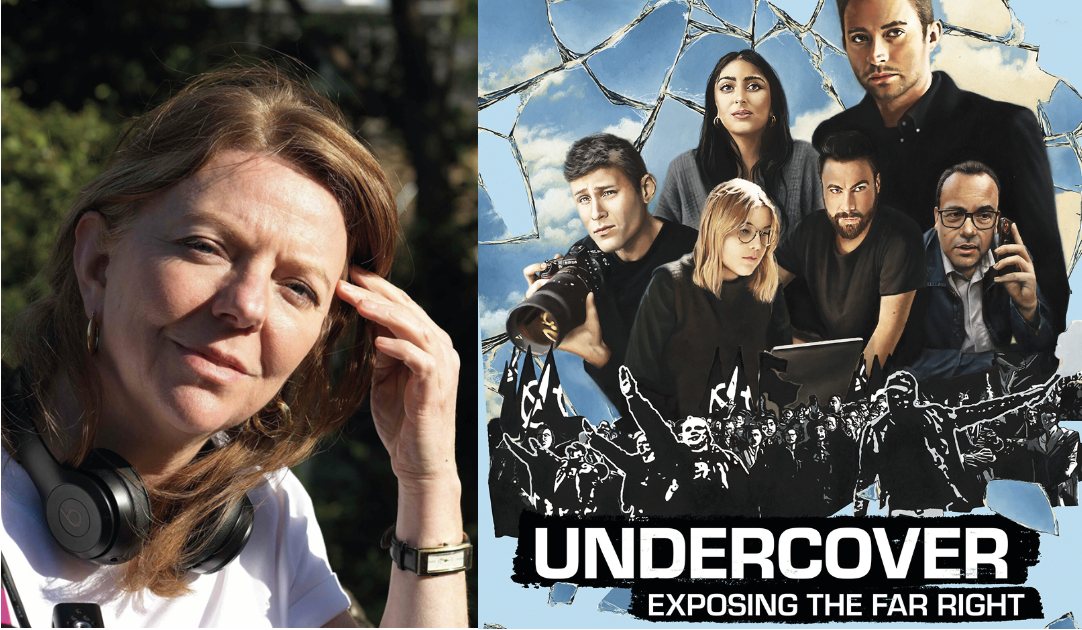For our inaugural DFC Member Spotlight we are featuring award-winning Director and DFC Member, Havana Marking.
Havana is known for working on films that bring depth and insight to the stories behind the headlines. Her most recent feature, Undercover: Exposing the Far Right is out now on Channel 4 and is touring film festivals globally.
We spoke to Havana about the making of her latest work and London Film Festival’s recent decision to pull the film from their programme at the eleventh hour due to safety concerns. The outcome has sparked major discussions around the wider implications of self-censorship and the responsibilities of our cultural institutions in the UK and beyond. Read on for the full interview.
Emily Copley: Can you tell us a little bit about yourself? What’s your background and how did you come into doc filmmaking?
Havana Marking: I didn’t study film, but had a good film education from home. My mum, Stacy Marking, was one of the first female doc directors in the UK and so I was always versed in documentary and independent film. She would take me to weird matinee double bills to watch, often political, auteur movies. Things like Soylent Green, or Fahrenheit 451. Up the Junction – a Loach-Garnett drama with documentary edge – was very influential.
In 2000 I started working in factual TV, having worked on local papers. I started as a researcher, and I deliberately moved between genres learning all the different styles. Later in the decade, the industry was swamped with reality TV. I dipped my toe in and hated it so much; contributors were openly lied to and food might be withheld to get the desired onscreen slanging match. I knew I needed to find an alternative to the mainstream.
My first directing commission was a comic animated theory of relativity for the C4 3 Minute Wonder strand, and then I won the C4 Pitch at Sheffield (sadly neither of these exist for new directors today). Afghan Star was my foray into the arthouse feature doc world. This was a pure observational film following contestants at a local music talent TV show. It won best director and audience award at Sundance 2009. I never looked back.
EC: Your most recent feature Undercover: Exposing the Far Right just premiered at IDFA and is currently being broadcast by Channel 4. For those who are yet to see it, can you tell us briefly what it’s about?
HM: For years I directed films, travelling around the world to highlight or expose the stories behind the headlines. I loved how granular human stories could reflect the geopolitical story. About five years ago I realised that the front line is here, in Western democracies. The rise of the far right over the last decade is terrifying and I wanted to find a way to tell that story in the UK.
It took a long time to get access to Hope Not Hate, Britain’s leading antifascist organisation, but once I did, I was in, embedded with their team on a frightening but thrilling secret investigation. I followed journalist Harry Shuckman as he went undercover into different groups ranging from typical street level foot soldiers to the elite “intellectual” circles repackaging eugenics. In the process they uncover a funding network that leads to Silicon Valley. All the while the staff at HNH are enduring incredible harassment and threats to life from Tommy Robinson and his supporters.

“I hope all the increasingly risk-adverse broadcasters might see why they need to be a little braver.”
EC: The film recently hit the headlines when London Film Festival (LFF) pulled it from their program due to safety concerns. Can you tell us about the impact of this on the release and the wider implications for political documentary?
HM: This was so disappointing and did affect us enormously. Of course, we were able to leverage the press and use it to maximise the publicity, but ultimately it was devastating. A feature doc specifically relies on festivals for international reviews which allow the film to cut through. We had fantastic domestic TV reviews (5 Stars in The Guardian and The Telegraph), but nothing in the international trade press. Plus, the knock-on effect for UK theatrical release, film awards, and qualification for UK tax credit – the further implications of that decision were clearly not taken into consideration.
Worse though is the chilling implication for political docs in the current climate. We had to fight for this film to be made. We – alongside the people we filmed – risked huge amounts in the making of it. To be denied an audience for fear that something might happen – there were no actual threats – seemed cowardly in the extreme. We offered alternative options but still the fear won out. The NFT is one of the most secure and wealthy venues in the country. If LFF are too scared, what message does that send to the smaller cinemas? The only winner from that decision was the far right, who must feel emboldened way beyond they deserve.
EC: What can you tell us from your recent experience about funds, particularly those which are state-led, and broadcasters during the political climate of today?
HM: Anecdotally across Europe and the US we are hearing of film festivals and broadcasters having their funding threatened by the new populist and far right governments we are seeing grow in strength. A typical sale for us would have been PBS for example, but since the Trump election that seems unlikely.
I’m afraid the UK is not immune to this either. The LFF weren’t the only institution to let us down. Originally, in 2023 when the Tories were still in power and MPs like Lee Anderson and Suella Braverman were spouting far right language, we were commissioned as a BBC Storyville doc. But facing up to Tommy Robinson and his like, and highlighting the toxic parliamentary debates, clearly sent the broadcaster into a tailspin. Ultimately the impartiality clause was used against us.
Over the months they changed their conditions: They wanted a voice over; they wanted it presenter-led by a BBC journalist; it could only air in 2025 (i.e. after the election); it was considered dangerous for a director like me (a woman) but they couldn’t actually help with security; we would have to interview Tommy Robinson – an open Islamophobe, a convicted criminal and proven liar, who has form for harassing journalists – for balance.
We were told this had nothing to do with politics… but regardless, this was not the film we were making, and there was no way I could give Robinson a platform. We had to part ways.
We were thrilled then when Channel 4 stepped up and took on the story as we had pitched. The C4 team gave us the opposite experience: from the first day they were dedicated to making this the strongest film it could be and giving us the robust legal and security help we needed. By the time our right to replies were sent, our journalism was so watertight and solid, even Silicon Valley couldn’t frighten us.

“My God, now more than ever this industry needs a voice. It’s a very tough time for a multitude of reasons, and if we can come together to represent ourselves that gives us a place at the table.”
EC: Often with issue-driven films, especially those that are politically charged, we forget to talk about filmmaking craft. I’m sure that’s something you have been dying to talk about. Do you want to share some insights into the process behind making the film?
HM: Yes! Definitely. In a sense, the style of the film came from the story itself. This was a genuine spy mission and so I looked at all the tropes of that genre: music, lighting, movement, position of camera. But like Afghan Star, this was pure observational filmmaking. There was no chance to recce or repeat actions or set up lights. For safety reasons we had to use small agile cameras that could fit into a handbag at any moment.
The action – grabbed in taxis or hotel rooms, or from below tables or in doorways – naturally set the pace and feel (and was shot brilliantly by Tom Turner), but we worked hard to bring all those factors together in the edit to make it a thriller in the telling. Because we had both the Spy (with his secret camera) and his Handler (Patrik Hermanssen), we were able to crosscut a lot of scenes giving us the movement and anticipation of a drama. The final scene, edited beautifully by Ross Leppard, is a masterpiece of tension.
EC: Is there anything else you would like to share with our members that you haven’t had the opportunity to yet?
HM: It’s important to point out that observational films like this are rarely commissioned any more. It feels like a dying art. I see this as a love letter to the genre and know that the 5-star reviews and incredible response we have had are testament to the power of this kind of filmmaking. I hope all the increasingly risk-adverse broadcasters might see why they need to be a little braver.
EC: And finally, we would love to know why you became a DFC member and why you would encourage others to join too?
HM: My God, now more than ever this industry needs a voice. It’s a very tough time for a multitude of reasons, and if we can come together to represent ourselves that gives us a place at the table. I hope the more people join and become full members, the more all the stakeholders – the government, the broadcasters, the streamers, the cinemas etc – will listen. Culture is more vital than ever. Speaking truth to power is more necessary than ever. Documentaries are more important than ever.
You can watch Undercover: Exposing the Far Right right now on Channel 4 HERE.
BBC statement in response to the interview:
The BBC started working with the film makers after the main body of the film had already been shot. It isn’t always possible to reach agreement with film makers about how to complete films within BBC editorial guidelines. In the end, the film makers decided to take the film elsewhere.
Storyville remains committed to bringing BBC audiences a broad range of independent, award-winning, and often complex documentaries from around the world such as Beyond Utopia, Black Box Diaries, Mr Putin vs Nobody, Khartoum and Hollywoodgate.

